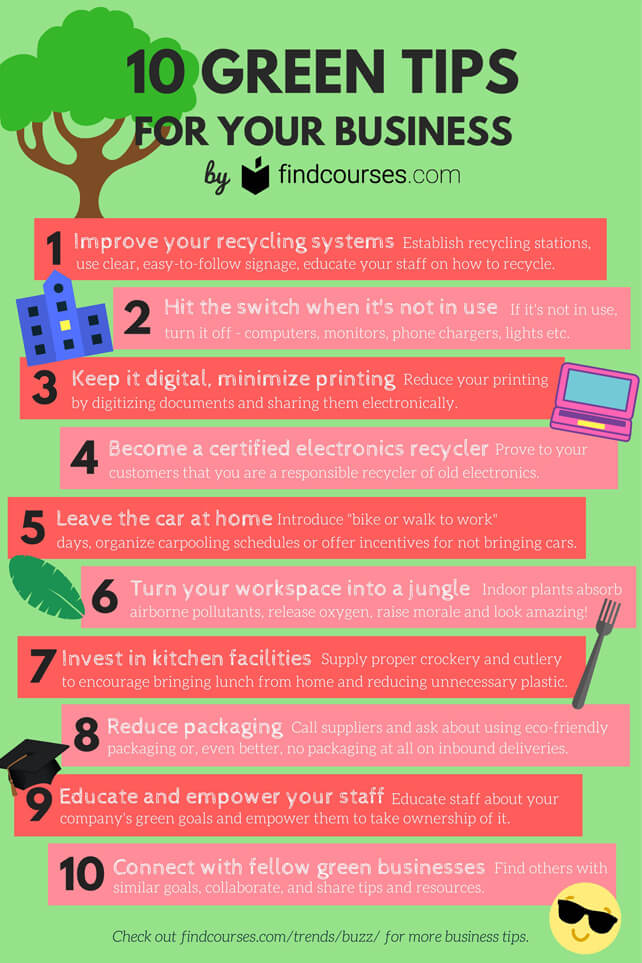With global warming, pollution and natural resource depletion in the spotlight, the effort of the environmentally-conscious business has never been more important. An increasing number of companies are reconsidering their processes and the effects they have on the environment, and sustainability strategies are fast becoming necessary in order to keep the competitive edge.
Whether you are looking for ways to completely reshape the way your company runs or just a few simple steps to get the ball rolling, it's never too early or too late to start implementing processes to reduce your business' footprint on the environment.
Here are ten easy and attainable tips that you can introduce into your workplace culture today!

1. Improve your recycling systems
Establishing recycling stations around the workplace is the first step to reducing your business' footprint. Make sure everything is labelled clearly and that your staff are well-informed and understand how it all works - reducing may sound simple and basic but knowing what can and cannot be recycled or composted is not always so crystal clear.
2. Hit the switch when it's not in use
If it's not being used, turn it off. Spare computers or monitors should be switched off, phone chargers unplugged, and lights turned off after hours or in vacant rooms or put on auto-timers.
Another great option is to set a company policy that restricts screensavers on computers, instead setting monitors to power off after a certain period of inactivity.
3. Keep it digital, minimize printing
Reduce your printing by keeping things online. Digitize documents and share them electronically through servers or email in order to cut down on paper wastage.
If printing is unavoidable, consider changing your auto settings to black and white, and double-sided printing. Using smaller font sizes (within reason - people still have to read it) reduces the amount of ink used.
Using recycled, sustainable paper is a good compromise for necessary printing.
4. Become a certified electronics recycler
Becoming a certified electronics recycler proves to your staff and your clients that your company is dedicated to reducing the impact it has on the environment by responsibly recycling electronic waste such as old broken computers or monitors.
Learn more about becoming a certified electronics recycler here.
5. Leave the car at home
Consider what schemes you can implement to reduce the reliance on using cars to get to and from work. Introducing "bike to work" or "walk to work" days can be a great initiative. For those who live too far away to walk or bike, taking public transport such as buses and trains or organizing carpooling initiatives are great alternatives.
If your company is in the position, offering rewards or discounts for public transport costs could also go a long way to getting your staff into the habit of not relying on their own personal vehicles.

6. Turn your workspace into a jungle
Create some indoor-outdoor flow by decorating your office with plants and greenery. Not only are they great aesthetically but they also adsorb airborne pollutants and emit oxygen into the air, raising the mood and vibe of a room and your employees.
7. Invest in kitchen facilities
Supplying a kitchen, stocked with real utensils, plates and cups means reducing disposable one-use plastics.
Having a kitchen with cooking and/or heating facilities (i.e. microwaves) and washing facilities (i.e. dishwashers or cleaning products) encourages staff to bring their own food from home instead of "buying out" meals that come wrapped in plastic with plastic utensils.
8. Reduce packaging
Any initiatives to reduce the amount of packaging on transporting and delivering will not only help environmentally but it will also cut down on costs as well. A simple call to your suppliers could be all that is needed to reduce the amount of plastic and polystyrene packaging on incoming deliveries.
9. Educate and empower your staff
At the end of the day, it will mostly be your staff who will need to make the effort on most of these steps. Making sure your staff are well-educated on your company's green policies and practices is a vital way to ensure they are followed through on.
Signage, info packs, meetings and seminars are all great ways to ensure information is passed on and all staff are informed. Promote the fact you are a company that cares about their impact on the environment and empower them to take an initiative in their own work practices.
10. Connect with fellow green businesses
You aren't the only business looking at ways to become more environmentally conscious. Finding other local businesses with similar green goals or joining online networks can be a great chance to discuss strategies and identify any potential collaborations and resource-sharing opportunities.

